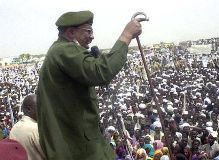Bashir slates campaign for intervention in Sudan’s Darfur
KHARTOUM, Sudan, Aug 08, 2004 (PANA) — Sudanese President Omor Hassan el-Bashir
has alleged that his government was targeted by a hostile
campaign aimed at concealing the truth and justifying possible
intervention the civil war-torn western region of Darfur, where
two rebel movements launched a revolt against Khartoum in
February 2003.
 Addressing the 14th National Labour Day at Friendship Hall here
Addressing the 14th National Labour Day at Friendship Hall here
Saturday, Bashir revealed that sedition also prevails in
eastern Sudan, where the forces of evil are allied to threaten
highways and terrorise innocent citizens.
He was referring to recent reports that the rebel Justice and
Equality Movement (JEM), one of two main rebel groups in Darfur,
had entered into alliance with the “Sudanese Free Lions
Association”, a rebel group formed by Beja tribesman of eastern
Sudan, to start military activities in the eastern region.
“I call on the people to be on high alert in order to ward off
the organised anti-Sudan campaign,” Bashir said, as the audience
chanted “Sudan alive…Allah Akbar…Death to our enemies2.
Bashir’s government is currently under unprecedented
international political pressure to find an urgent political
solution for what the United Nations describes as the world’s
worst humanitarian crisis in Darfur.
Bashir explained that the conflict in Darfur is a traditional one
over resources, adding that the government allocates more
development resources and basic services to the western region
than the other states in Africa’s largest country.
He accused what he termed as “ill-intentioned circles” with a
“secret agenda” of fabricating reports of marginalisation, ethnic
cleansing, genocide and rape in Darfur and bringing the problem
to the corridors of the UN.
Last Friday, Bashir’s government signed an agreement with the UN
in Khartoum to created safe areas for displaced Darfur villagers.
Khartoum also promised to disarm the marauding Arab Janjaweed
militia and stop misconduct by its own troops towards civilians
in the region.
The two sides also adopted a Plan of Action for Darfur under
which Khartoum pledged to curb military movements by the pro-
government militia and the rebels opposing them around the safe
areas.
Responding to claims by humanitarian agencies that the government
wanted to force the internally displaced people to return to
their villages, most of which have been burnt by the Janjaweed,
Bashir asked: “is the Western world concerned about Sudanese
interests more than the Sudanese people themselves do? Did the
Western forces provide credible justifications for the war they
waged in the name of human rights, combating terrorism and
dismantling weapons of mass destruction?”
The President affirmed that the concern of his government about
the conflict in Darfur was motivated by national, religious,
moral and constitutional responsibilities rather than
intimidation and promises for aid.
He affirmed that the situation inside internally displaced people
camps in Darfur were improving and stressed his determination to
overcome the crisis in Darfur region, although international help
was needed.
Bashir urged Sudanese workers to assist in the repatriation of
displaced people and rehabilitating the social fabric in Darfur.
The UN estimated that 50, people have been killed since the
17-month conflict erupted between government troops and Janjaweed
militias on one hand, and the rebel Sudan Liberation Movement and
JEM, on the other. The conflict has also displaced some 1.2
million people from their homes and driven over 100,000 across
the border into neighbouring Chad.
On 30 July, the UN Security Council adopted a resolution that
gave Khartoum up to 30 days to bring the situation in Darfur
under control, including disarming Arab militias, or face
international action.
